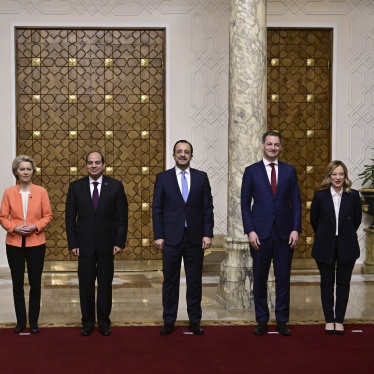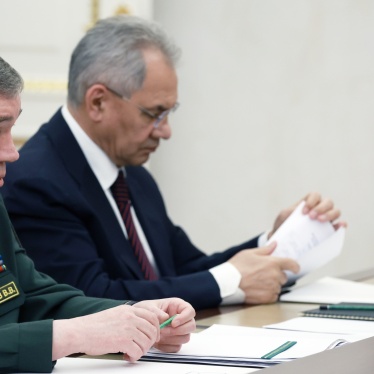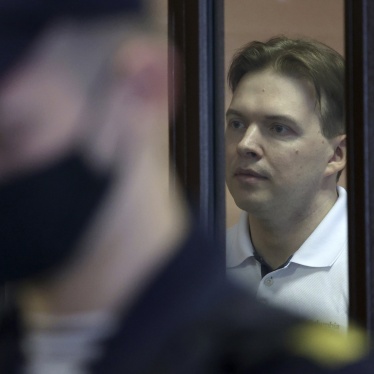Secretary General Burić,
We, the undersigned organisations, wish to convey to you our grave concerns about the situation of Dr Gubad Ibadoghlu and urge you to as exercise your power under Article 52 of the European Convention on Human Rights (ECHR) to require the Azerbaijani authorities to provide information concerning Dr Ibadoghlu’s current state of health and to urge his immediate release so that he can obtain adequate medical care.
Dr Ibadoghlu is a renowned Azerbaijani scholar of political economy, a research fellow at the London School of Economics and Political Science, and anti-corruption activist. At time of writing, he has been held in the Baku Detention Centre for more than seven months and faces a potential maximum 17-year prison sentence following a violent abduction by plain-clothed police officers on 23 July 2023, as he was travelling with his wife to meet youth activists from the Azerbaijan Democracy and Prosperity Movement (of which he is the chairperson).
The authorities have since levelled charges against Dr Ibadoghlu, accusing him of offences under Articles 204.3.1 (‘Manufacturing with a view of selling and selling of counterfeit money, state securities, or foreign currency or securities in a foreign currency by an organised group’) and 167.3.1 (‘Preparation, storage, or distribution of extremist religious materials’) of the Criminal Code. Numerous human rights organisations consider the charges against him both fabricated and politically motivated, and have called for them to be dropped and for Dr Ibadoghlu to be immediately released.
On 24 July, the Narimanov District Court ordered a pre-trial detention period of 3 months and 26 days but failed to provide any substantive justification for the detention, solely referencing the gravity of the charges. The authorities have since dragged their feet in the case, conducting no active investigation since early October, a fact indicative of their political motivation and lack of genuine evidence. Meanwhile, the court extended Dr Ibadoghlu’s pre-trial detention twice, first, on 16 November and, later, on 15 February, in both cases for periods of three months and without providing the justification required under international law.
According to his family, the authorities are preparing to level a further bogus charge of money smuggling against Dr Ibadoghlu, signalling their intent to prolong his detention.
On 14 September, the European Parliament adopted a resolution demanding Dr Ibadoghlu’s ‘immediate access to adequate medical treatment and medication’, as well as urging the Azerbaijani authorities to release political prisoners, human rights defenders, and independent journalists from detention.
Following a Rule 39 request, on 20 September, the European Court of Human Rights (ECtHR) ordered the Azerbaijani government to take urgent measures to protect Dr Ibadoghlu’s health, this time including submitting him for medical examination, particularly with relation to his aortic condition, and to transfer him to a hospital if necessary. The court also required the Azerbaijani government to provide regular updates about Dr Ibadoghlu’s health and the treatment provided.
Since September, Dr Ibadoghlu’s health has deteriorated significantly. However, despite increased international attention and the measures indicated by the ECtHR, Azerbaijani authorities have refused to provide him with adequate care commensurate with his health conditions, thus further risking his life.
Dr Ibadoghlu suffers from Type-2 diabetes, uncontrolled hypertension (high blood pressure) that has caused system damage including aortic root dilation, and severe back pain. Prior to his detention, Dr Ibadoghlu managed these conditions through nine medications daily, a balanced diet, and daily walks. However, the severe stress, psychological abuse, and inhuman conditions which characterise his detention have exacerbated his medical conditions and led to the development of new health problems.
Dr Ibadoghlu’s diabetes appears to be worsening under his detention. Medical tests performed in the pre-trial detention facility indicate that Dr Ibadoghlu’s blood sugar has not normalised for a single day of his detention. His blood sugar levels, which Dr Ibadoghlu measures several times a day using a glucometer that his family provided him, have risen continuously since his detention, despite the introduction of insulin therapy and a higher dose of metformin hydrochloride. As recently as February 18, when both Dr Ibadoghlu and prison authorities separately measured his blood sugar, both readings indicated a worsening of his condition.
Dr Ibadoghlu’s family has said that on February 8, an endocrinologist with the Justice Ministry’s medical unit in the prison facility orally conveyed to Dr Ibadoghlu that she had diagnosed him with peripheral nerve damage (diabetic polyneuropathy), for which she prescribed treatment. However as of this writing, neither this diagnosis nor the treatment were added to his medical history. According to his family, Dr Ibadoghlu has suffered partial loss of eyesight, due to his unmanaged diabetes, potentially exacerbated by his cell being illuminated 24 hours a day.
According to his lawyer and family members, an echocardiogram performed in the prison facility in August 2023 found that his aortic dilation had deteriorated.
The family has also said that in September, the Ministry of Justice medical unit at the detention facility diagnosed Dr Ibadoglu with development of left ventricular hypertrophy and diastolic dysfunction following an echocardiogram, while his heart rate has remained dangerously high at a persistent 115-120 bpm.
Medical tests also found that he has developed gall bladder deposits, nodules in his thyroid gland, stone formations in his kidneys, and an enlarged prostate.
According to the government’s November 6, 2023 submission to the ECtHR, an MRI carried out in October found damage to Dr. Ibadoghl’s L3, LR, and L5 intervertebral discs, as well as degeneration of the spinal column (lumbar osteochondrosis). The government stated in this submission that Dr. Ibadoghlu was "provided with required medication.” He has also received physiotherapy. However Dr Ibadooghlu’s family have said he experienced a severe worsening of his back pain, resulting in partial loss of the ability to walk, an inability to sleep more than two to three hours per night, and accompanying chronic fatigue.
The prison authorities have also refused to allow Dr Ibadoghlu to have in-person meetings with family without contact barriers. All meetings are through barrier glass, whereas we understand that in other cases, detainees are allowed face-to-face meetings. Although Dr Ibadoghlu can meet regularly with his lawyers, their conversations are under visual and audio surveillance. Dr Ibadoghlu cannot, unlike other detainees, initiate contact with his lawyers. Although Dr Ibadoghlu now needs a cane to support him to walk, prison officials refuse to allow him to receive one for use from his family, making it impossible for him to exercise for the two hours he is entitled, under Azerbaijani regulations, to have for outside walks per day.
Dr Ibadoghlu’s family has said that the above mistreatment has worsened his distress.
Despite the severe risk of irreparable damage to Dr Ibadoghlu’s health, Azerbaijani authorities have refused to provide appropriate medical treatment, in some cases denied his illnesses, and refused to allow him to be transferred to a specialised treatment facility. The government’s response to the ECtHR claimed that Dr Ibadoghlu’s blood sugar levels and diastolic blood pressure were lower than as he reported through self-monitoring. It appears to have distorted other information in communications to the ECtHR which purport to show that Dr Ibadoghlu’s health condition is ‘satisfactory’. The Azerbaijani Ministry of Foreign Affairs and Presidential Administration have likewise responded to inquiries by international organisations and foreign officials by denying Dr Ibadoghlu’s health conditions and claiming, incorrectly, that necessary medical care has been provided.
Dr Ibadoglhu’s lawyers have lodged various official complaints with the Azerbaijani Ministry of Justice and Penitentiary Service, the board of the Baku Detention Centre, and the Narimanov District Court about his treatment. All such complaints have been rejected, including 45 separate appeals to the district court.
The refusal of the Azerbaijani authorities to facilitate the urgent medical interventions necessary to preserve Dr Ibadoglhu’s health, instead allowing his condition to deteriorate, violates a number of Dr Ibadoglhu’s rights under the ECHR.
Moreover, the authorities have denied and continue to deny access to Dr Ibadoghlu for the International Committee of the Red Cross, the Delegation of the European Union to Azerbaijan, 13 foreign ambassadors, the International Rehabilitation Centre for Torture Victims, and the Parliamentary Assembly of the Council of Europe’s co-rapporteurs for the monitoring of Azerbaijan.
We, the undersigned organisations, Dr Ibadoghlu’s family, and many others in Azerbaijan and among the international community, are gravely concerned about the severe threat to Dr Ibadoghlu’s life presented by the refusal of the Azerbaijani authorities to recognise the severity of his medical conditions and facilitate necessary medical interventions. Should the authorities continue to allow Dr Ibadoghlu’s health to deteriorate, his death is a very real possibility. We therefore urge you to use the power granted to you under Article 52 of the ECHR to require the Azerbaijani government to reveal the true state of Dr Ibadoghlu’s health and what measures it has taken to implement the 20 September measure from the ECtHR. We ask that you urge the Azerbaijani authorities immediately to release Dr. Ibadoglu pending trial so he can undergo all medical treatments by independent medical personnel.
We appreciate your urgent attention in this matter and stand ready to provide any and all further information that you may require.
Signed,
Eugenia Andreyuk Programme Coordinator
Regional Programme on Europe and Central Asia
OMCT
Simon Papuashvili, Programme Director
International Partnership for Human Rights
Tania Marocchi, Director
Eastern Partnership Civil Society Forum Secretariat.
Hugh Williamson, Director
Europe and Central Asia division
Human Rights Watch






